Loopholes in Debt Forgiveness for Small Businesses
The government writes off non-performing loans of fishermen and small business owners. Detailed criteria can prevent moral hazard.
maaf email atau password anda salah

The government writes off non-performing loans of fishermen and small business owners. Detailed criteria can prevent moral hazard.

Hashim Djojohadikusumo is leading the Indonesian delegation at the climate change conference. But he is more a representative of corporate interests.

The new government is trying to erase traces of past human rights violations. This hurts the victims and their families.

The investigation into the Communication and Digital Affairs Ministry employees backing online gambling is expanded to include many people. Ill-gotten gains from a political operation.
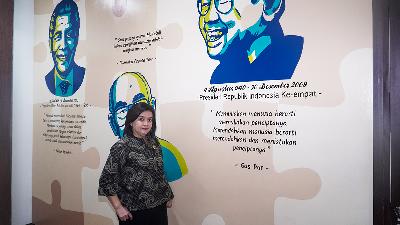
National Commission on Human Rights (Komnas HAM) Chair Atnike Nova Sigiro on human rights enforcement in the Prabowo Subianto era.

The presence of Hashim Djojohadikusumo at COP29 in Azerbaijan was considered as bearing a conflict of interests. He was promoting the business of Arsari Group.

Prabowo’s close associates worked to prevent the issue of serious human rights violations from resurfacing. They prepared a white paper containing a narrative aimed at clearing Prabowo’s name.

The number of people suspected of protecting online gambling sites increases to 18. Employees of the Communication and Digital Affairs Ministry are involved.

The Communication and Digital Affairs Ministry is tidying up house now that 10 of its employees are accused of participating in online gambling. Their flow of cash is being scrutinized.

Former Communication and Informatics Minister Budi Arie Setiadi is implicated in an online gambling case. He allegedly met with representatives of gambling operators.

Efforts to block online gambling sites are proven futile, as many loopholes remain. Online gambling remains rampant in Jakarta.
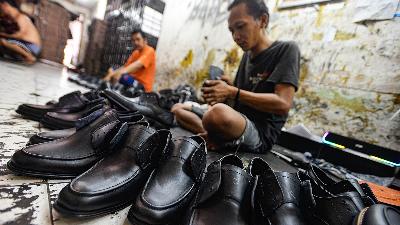
The disbursement of People’s Business Credit faces numerous challenges. Farmers and small business owners are vulnerable to loan sharks and middlemen.

We launch Tempo single brand, with news products integrated under one platform. Scores of new services will be offered.

The most significant factors behind Trump’s victory were Covid-19 and the Federal Reserve’s response. Life is likely to become harder for Americans—and for much of the rest of the world.

There are many irregularities in relation to the detention of Tom Lembong. Without sufficient evidence of corruption, this case can be considered as politicization, and not enforcement, of the law.

Minister of Higher Education, Science and Technology Satryo Soemantri Brodjonegoro explains BRIN’s position in the Prabowo government.
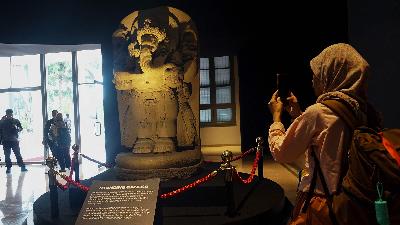
A collection of hundreds of cultural artifacts from the second phase of repatriation from the Netherlands is on display at the National Museum of Indonesia.
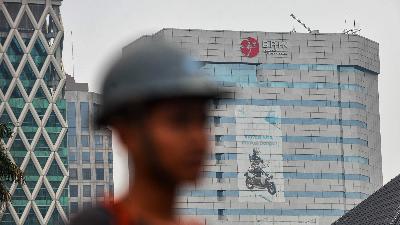
The position of BRIN remains uncertain under Prabowo Subianto’s administration. The restructuring of the research agency is hampered by political interests.

Jokowi and the police are helping to bring Ahmad Luthfi-Taj Yasin to victory in the Central Java Regional Head Election, allegedly pressuring village heads to show support.

Tom Lembong’s lawyer on the irregularities of his case.
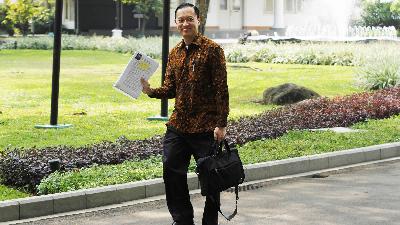
Tom Lembong owns assets worth Rp101 billion but does not own a house. He does not live with his wife and children in Jakarta.

The Supreme Audit Agency uncovered violations in sugar import practices during various periods of the Trade Ministry. Only Tom Lembong, the Trade Minister for 2015-2016, is indicted.

The Attorney General’s Office is still withholding the evidence in the sugar import case involving Tom Lembong. State losses remain unclear.

BI faces a dilemma over cutting rates amid the global volatility stirred by Trump’s victory.
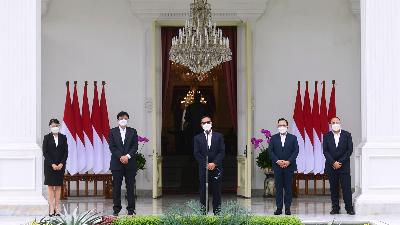
The Indonesia Investment Authority is set to merge with Danantara, but it still fails to optimize investments and faces ongoing issues with foreign investor confidence.

In the face of ambivalence, who is evil? It is those who choose greater evil or lesser evil.
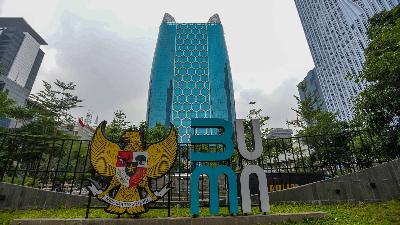
The plan for a super-holding for state-owned enterprises dates back to the New Order era. The SOEs Ministry will be replaced by a giant corporation.
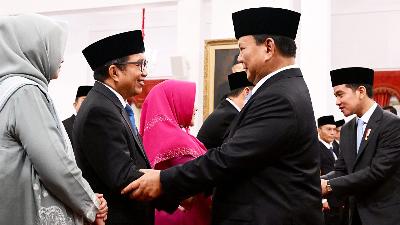
Prabowo Subianto is establishing BPI Danantara to manage state-owned enterprises. There are reportedly tug-of-wars and a number of obstacles in the process, including the obligation to revise laws.
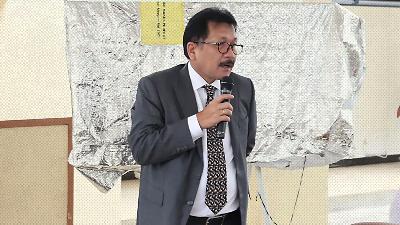
Judge bribery suspect Zarof Ricar was once a high-ranking Supreme Court official. He bankrolled a film about a judge.

The Supreme Court dismissed three judges suspected of accepting bribes in the Ronald Tannur case. This adversely impacts efforts to improve the judiciary.
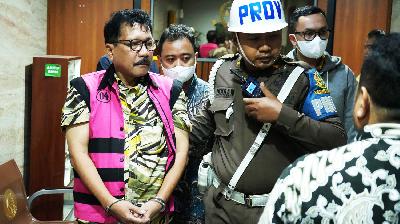
The Rp920 billion found in Zarof Ricar’s house is suspected of being related to arranging court case verdicts. The Corruption Eradication Commission once detected his corrupt exploits.

Judicial Commission Chair Amzulian Rifai on the corruption in judicial institution involving judges.

The food estate program, or rice field creation initiative in Central Kalimantan, was neglected and instead converted into oil palm plantations owned by private companies.

Ridwan Kamil’s electability remains stagnant in the Jakarta regional head election. His supporting parties are not actively campaigning for him, leaving him hoping for support from Prabowo and Jokowi.
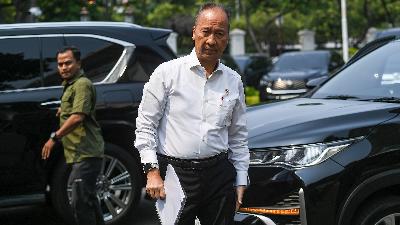
Interviews with Industry Minister Agus Gumiwang Kartasasmita and Sritex President Commissioner Iwan Setiawan Lukminto on the company’s bailout.

Kamala Harris champions women’s legal and political rights, countering Donald Trump’s machismo.

Former Trade Minister Thomas Lembong is arrested by the Attorney General’s Office over corruption allegations. When will other ministers be questioned?

Prabowo Subianto is hoping to erase his sins in relation to the 1998 kidnappings. Gross human rights violations will not be a priority.
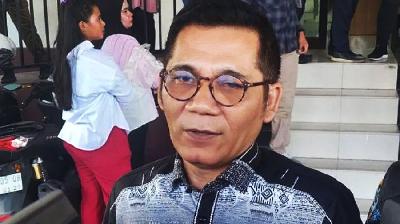
Former North Maluku Governor Abdul Gani Kasuba acknowledged meeting with Bobby Nasution but claimed he gained no advantage from it.
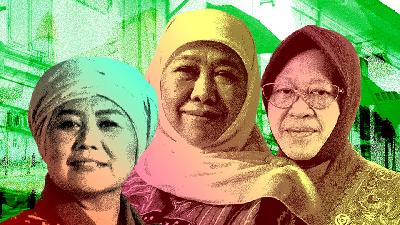
Three East Java gubernatorial candidates—Luluk, Khofifah, and Risma—talk about the competition in the 2024 regional head elections.
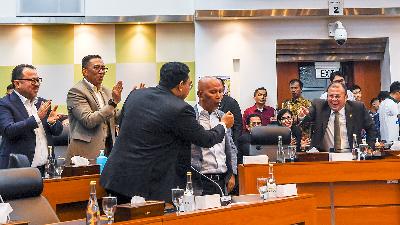
The PDI-P received the most positions as leaders of the DPR working bodies. Surya Paloh met with Bahlil Lahadalia to discuss the allocation of commission chairs.

The new ministries and agencies established by Prabowo Subianto cannot operate immediately. Some lack office space, have tight budgets, and are short on staff. The authority of the Haj and Umrah Organizing Agency even violates the law.

The rupiah is weakening amid the power transition, with global factors also exerting heavy pressure.

The new government under Prabowo Subianto is already formed. Can we hope for what the future holds?

The phrase “human rights” was lost from Prabowo Subianto’s inauguration speech.
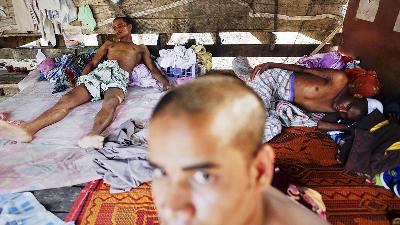
Rohingya refugees in Thailand, Malaysia, and the Philippines are treated differently than those in Indonesia.

There are indications of problems with the IPO of Barito Renewables Energy. The stock exchange and capital markets authorities are neglecting their responsibilities.

There is an increasingly real threat to Indonesia’s biodiversity. It cannot be overcome through empty slogans at international forums.

The KPK should designate Sahbirin Noor a fugitive. There is a good chance the South Kalimantan Governor will go free.

Prabowo Subianto is inheriting an inefficient economy. Yet his new administration is likely to follow Jokowi’s economic model.
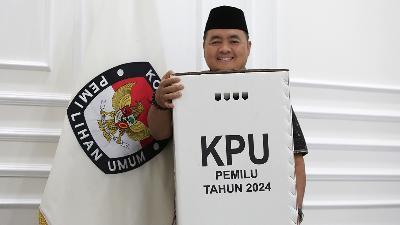
KPU Chair Mochammad Afifuddin on turbulence within his institution following the dismissal of Hasyim Asy’ari, and the Constitutional Court’s decision on the regional head elections.

South Kalimantan Governor Sahbirin Noor is suspected of receiving commissions on three projects in the e-catalog. He has not been seen since being named a suspect.
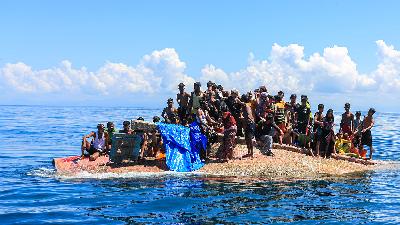
Uncertain future looms over Rohingya refugees in Indonesia. They are also struggling with various limitations.

The KPK uncovered alleged embezzlement of the Taspen pension fund involving Sinarmas Sekuritas. The result of poor supervision by the OJK.

A number of policies from Minister Sakti Wahyu Trenggono are riddled with conflicts of interest. They benefit his son, Indra Trenggono.
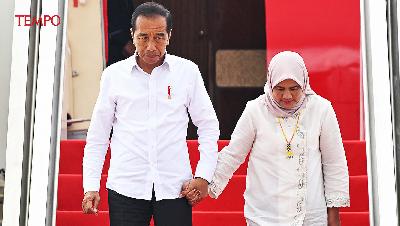
Jokowi is like a king reluctant to relinquish his crown. Nearing retirement, he is still trying to improve his image.

Farwiza Farhan, the winner of the 2024 Ramon Magsaysay award talks about conservation of the Leuser Ecosystem in Aceh.
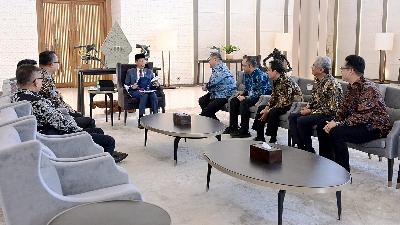
Various parties from the National Police Chief to the State Palace are accused of interfering in the KPK leadership candidates selection process. The candidates are divided into four clusters.

The KPK is investigating Taspen’s investment losses. Sinarmas is behind the transaction.

Minister Sakti Wahyu Trenggono revives a shutdown port. There is indication that the minister’s son is involved in the fisheries business.
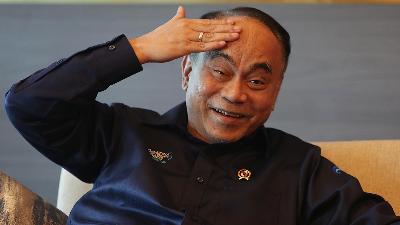
Tempo’s interview with Minister of Communication and Informatics Budi Arie Setiadi about Jokowi’s campaign before the end of his tenure.

Jokowi’s campaign promoting his successes is considered as not portraying actual conditions. Customary communities are among the victims of his administration.

The market showed no positive reaction ahead of Prabowo Subianto's government, which was held back by the high amount of debt.
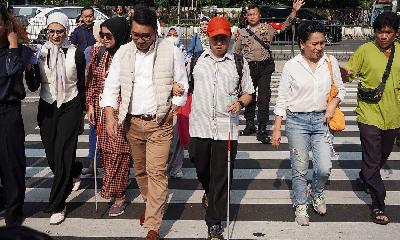
Jakarta governor and deputy governor candidates promise improvements in inclusive public transportation.

Instead of paying its debts, the Bakrie Group is suing 12 creditors. This could become a bad precedent for the investment climate.

The contest for the selection of the Supreme Court Chief Justice is heating up. There are indications it is riddled with the interests of the government and tycoons.
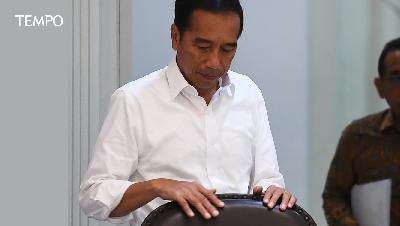
Jokowi passed a number of strategic policies at the end of his administration. Making the president-elect a hostage to fortune.
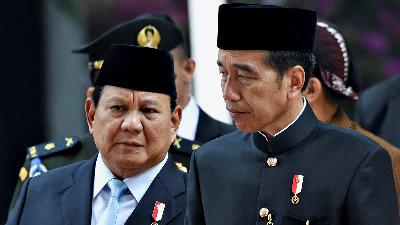
Before Jokowi’s term ends, the Presidential Palace is maneuvering to provide cover for Gibran. This includes erasing traces of the Fufufafa account as well as interfering in the formation of Prabowo’s cabinet.

Luhut explains his close ties with Jokowi, and the plans of the president-elect Prabowo. This is his first interview with Tempo after the one on the Panama Papers eight years ago.
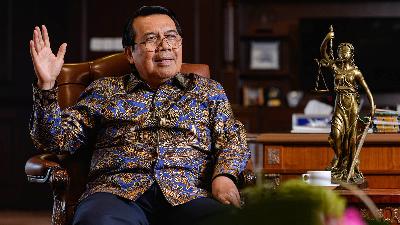
Supreme Court Chief Justice Muhammad Syarifuddin uses artificial intelligence to handle cases. Case brokers continue to be a threat.
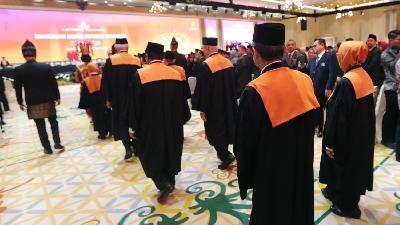
The race for the position of Chief Justice of the Supreme Court is heating up amid a flurry of allegations against certain candidates. There is suspicion of backing from business circles.

Indonesia and other countries continue to oppose the European Union’s Deforestation Regulation. The European Commission proposes a delay.
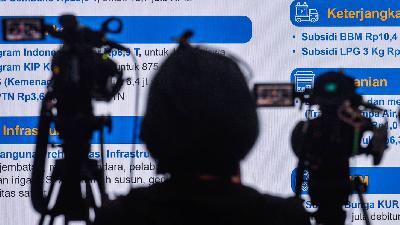
Media companies are experiencing upheaval due to the rapid changes in the business landscape. The industry is moving towards a new equilibrium.
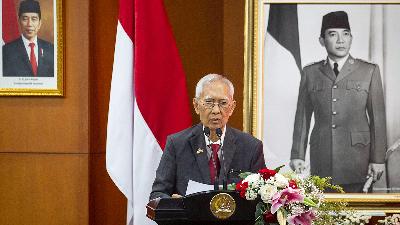
President Joko Widodo is suspected of supporting the restoration of Suharto’s name, with a possibility of being declared a national hero.
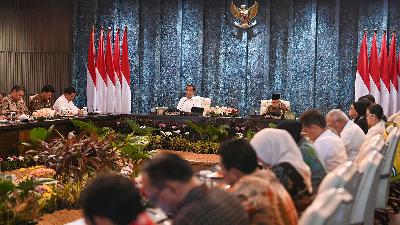
Jokowi is preparing for the incoming Prabowo-Gibran administration starting in late February 2024. He hopes that Prabowo can continue his programs.

Indonesia’s economy and financial markets are once again facing volatility stemming from China and the Middle East, leaving no respite for investors.

Power is never without crisis. Tumapel shows power as a story of unending antagonism.

With old faces still occupying more than half the seats, can DPR members be trusted to speak up and truly represent the people’s voice?

The kidnapping of pilot Phillip Mehrtens was ended through negotiation. This is a lesson for the Prabowo administration about how to resolve the Papua conflict.
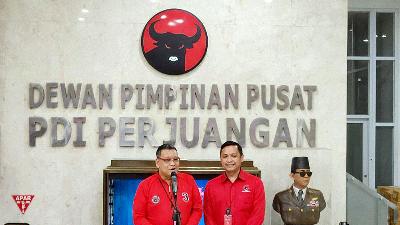
Political parties replace elected legislative members over alleged vote manipulation.
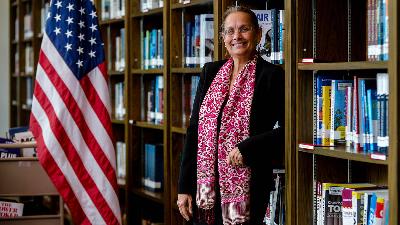
United States Ambassador Kamala Shirin Lakhdhir speaks about women, education, and Indonesia’s new administration.

The partnership between Riau regional company and Kingswood Capital Ltd resulted in criminal charges, with two top executives now facing allegations of embezzlement.

The government plans to dredge 17.6 billion cubic meters of sea sand and sediment, altering the landscape and destroying marine life.
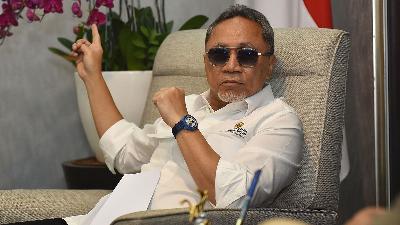
Trade Minister Zulkifli Hasan on the issues ranging from sea sand export policy to Prabowo Subianto’s bureaucratic management style.
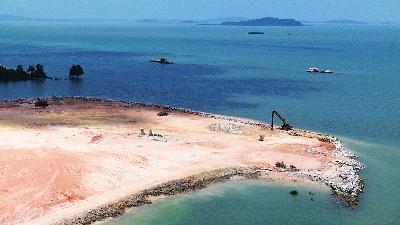
The government designated a number of areas as zones for cleaning sediment and sea sand.
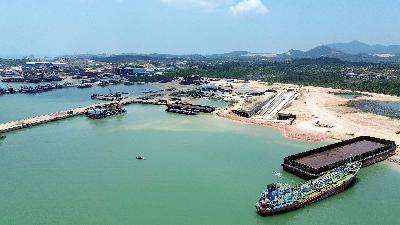
Dozens of companies are seeking permits to process marine sediment. They include businessmen, regional head candidates, and former cabinet ministers.

Indonesia is poised to fall into the middle-income trap. Only a few people enjoy the economy pie.

The hand of the government is apparent in Kadin’s internal conflict between Arsjad Rasjid and Anindya Bakrie. This has no effect on the public.

The food estate projects in Merauke are at risk of failure. There are suspicions about the way the projects are shared out.

The KPK named five suspects in the Bank BJB advertising budget corruption, but it has yet to implicate high-ranking officials in the West Java Provincial Administration.
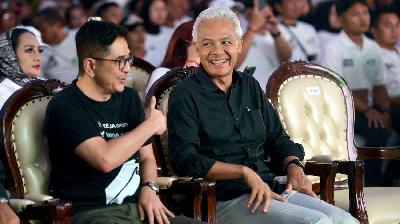
Arsjad Rasyid and Anindya Bakrie both claim support from regional Kadin branches. Legal battles continue.

The clearing of forests for the food estate project does not yet have an environmental impact assessment. It will be issued later.

Two food estate projects are simultaneously being launched, targeting 2.29 million hectares of forest and land in Merauke. There are intrigues involving Prabowo and Jokowi. This report is part of a collaborative coverage and research initiative by Tempo, the Pusaka Bentala Rakyat Foundation, and Trend Asia.

The rice paddy development program will sacrifice 1.02 million hectares of customary land in Merauke. It will also annihilate biodiversity.

Why do we still import rice from Vietnam? Is Indonesia not an agricultural country?

Preparing 2.9 million hectares of land under the food estate program in Merauke, South Papua, the government aims to achieve rice and sugar self-sufficiency within three to four years. Mirroring the previous failed food estate initiative.

There is a strong aroma of politics around the appointment of Saifullah Yusuf as Minister for Social Affairs. President Jokowi should focus on dealing with the problems of poverty.

The power wheeling scheme is important to end the monopoly in the supply of electricity. It could accelerate the energy transition.

The PDI-P should distance itself from the Prabowo factor in the regional head elections and also refuse to enter into coalition with Prabowo. For the sake of democracy.

China’s economic crisis has the potential to spread around the world. It can kill industries and manufactured goods in many countries.

The three judges who acquitted Ronald Tannur often reported for ethics violations. Their bank accounts show transactions amounting to the billions.
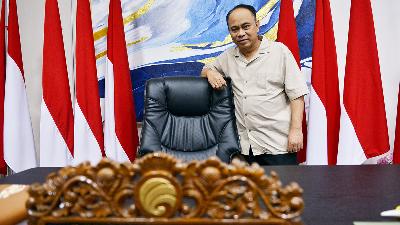
Communication and Informatics Minister Budi Arie Setiadi talks about the polemic over the planned revision of the Broadcasting Law and the Starlink Internet service.
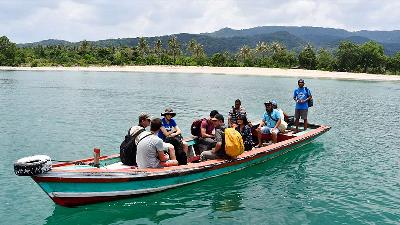
The Ministry of Environment and Forestry banned five foreign researchers, accusing them of painting a bad image of the ministry. It started from disparaging data on the orangutan population.

The health ministry has no need to be hesitant about legalizing cannabis for medicinal purposes. Legalization of the weed will solve many problems.
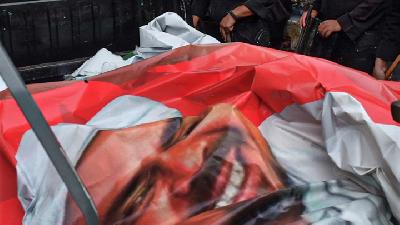
Banning all activity of the Islam Defenders Front solved nothing. There should be a strategic cultural design to address extremism.
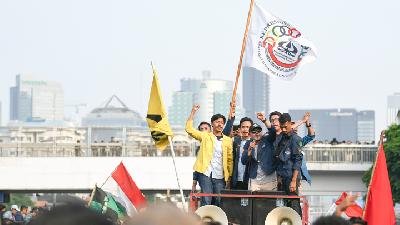
Seeds of the student resistance that ended in massive protests on September 23-24, 2019, had been planted long ago. Trisakti University, among the 1998 reform’s motors, again became the center of planning activities.

WITH regards to the letter from Mr. Dicky as published in the Letters column of Tempo magazine’s August 6-12, 2019 issue, Ministry of Agrarian Affairs and Spatial Planning/National Land Agency (ATR/BPN) would like to convey that:

Johannes Marliem was in contact with Tempo reporter Indri Maulidar from the end of July to early August.

Marijuana used to have a bad reputation, but recent research has proven its medicinal benefits. The question is whether this banned weed should be reclassified.

THE first order Mohammad Ramdhan Pomanto gave to his subordinates after he took office as Makassar's mayor in May 2014, may seem unconventional. Instead of sticking to the usual practice of asking the staff to translate campaign vision and mission statements into programs, the new mayor ordered all civil servants, including neighborhood and hamlet chiefs, to download WhatsApp on their mobile phones.
The mayor, who goes by 'Danny', was not the messaging app's brand ambassador. "I was only looking for a quick and effective communication channel," he explained.

THE first order Mohammad Ramdhan Pomanto gave to his subordinates after he took office as Makassar's mayor in May 2014, may seem unconventional. Instead of sticking to the usual practice of asking the staff to translate campaign vision and mission statements into programs, the new mayor ordered all civil servants, including neighborhood and hamlet chiefs, to download WhatsApp on their mobile phones.
The mayor, who goes by 'Danny', was not the messaging app's brand ambassador. "I was only looking for a quick and effective communication channel," he explained.

Tualang village in Riau initiated their family planning program through regular discussions and counseling. The village authorities work together with the local BKKBN, and it has been named as a model family planning village along with 13 others.

A community radio of Bina Darma University in Palembang gives a special slot every week for family planning discussions. They work together with the National Population and Family Planning Agency (BKKBN).

IT was almost midnight when the five seven-year-olds piled up their books on the table in the middle of the room. It was still raining outside. But Rosa Dahlia told the kids to quickly go home. As a teacher in Lualo District, Lanny Jaya Regency, Papua, she worried that they would come late to school the following day. "The next day, we were supposed to go swimming at a spring," Rosa explained in an interview two weeks ago.
This activity was to replace their regular Saturday film showing. That had to be canceled because she had left her laptop behind in Poga, a three-hour walk from Lualo. During the rainy season, the unpaved path connecting the two places turns to mud.

With a 1.49 percent annual growth rate, Indonesia's current population of more than 250 million is expected to surpass that of the United States by 2043, possibly becoming the third most populous country after China and India. Despite a national family planning program in place since 1967, Indonesia continues to struggle with various sociocultural constraints that prevent it from becoming more effective and efficient. Such issues emerged during the recent International Conference on Family Planning in Nusa Dua, Bali.
On the sidelines of the biennial conference, Tempo English contributing editor Cory Rogers spoke to Dr. Babatunde Osotimehin, the current executive director of the United Nations Fund for Population (UNFPA). Dr. Osotimehin, a Nigerian national who is serving his second term as head of UNFPA, shared his views on how empowering women through sexual and reproductive health rights is a key to unlocking Indonesia's development potential. Excerpts of the interview:

THE prohibition of application-based ojeks and taxis was revoked amid public outcry and the intervention of President Joko Widodo, who called it a hastily implemented ban. Too rigid in applying regulations, Transportation Minister Ignasius Jonan also made himself look uncaring to the city's dire need for proper public transportation system when he banned these popular modes of transport.
Referring to the Law No. 22/2009 on traffic and road transportation and Government Regulation No.74/ 2014 on modes of road transportation, Minister Jonan argued that online transport services were against the law. So, he sent a letter to the National Police chief on November 9 to go after Uber taxis and GO-JEK and GrabBike motorcycle taxis, also known locally as ojeks.

The heat did not seem to bother Johannes 'Jan' Pronk, 75, even though it has been 13 years since he last visited Indonesia. Perhaps it was a residue from the past, when he frequently travelled to Indonesia in his capacity as the Netherland's foreign minister and the UN's special envoy, and when he got acclimatized to the tropical, humid heat.
The bespectacled Pronk fits the description of a professor, rather than a politician and a diplomat of his yesteryears, given his current job as visiting professor at the United Nations University of Peace in Costa Rica and a lecturer at Amsterdam University College in the Netherlands.

Although it had been formalized last January, the National Mid-Term Development Plan (RPJMN) 2015-2019, a product of the National Planning and Development Board (Bappenas), still came under the public spotlight. The exclusion of a number of visions and missions of President Joko Widodo and Vice-President Jusuf Kalla during the election campaign came under sharp criticism.
But Bappenas Minister Andrinof Chaniago played down the criticism. He said the development plan was based on the government's work program for the next five years. "Those criticisms are just political maneuvers," Andrinof told Tempo reporter Firman Hidayat last week.

Measuring the social and economic development of a country has been done countless times, by means of various accepted formulas. But only in the last decade has the understanding of good governance as the key to effective development been seriously and intensively studied and researched. Based on 40 data sources, and produced by 30 organizations worldwide, since 2002, the Worldwide Governance Indicators have been applied to 200 countries to measure the country's level of governance. This has provided watchdog groups with the necessary tools to monitor policy and initiate reforms, which also helps to immeasurably assess perceptions of corruption among businesses, public officials and politicians. Much of the work can be attributed to Dr. Daniel Kaufmann when the studies were initially conducted at the World Bank Institute, where he worked. For the past two years, Kaufmann has headed the Natural Resources Governance Institute (NRGI), which pioneered the Resource Governance Index to measure the transparency levels of countries in managing their extractive industry. Kaufmann was in Indonesia recently to meet with public figures in government, the business community and members of the local civil society, and to be the keynote speaker at a panel discussion on 'The Impact of Low Oil Prices on Indonesia's Reform Agenda' which was co-organized by the NRGI and Tempo English magazine. He was recently interviewed by journalists Hermien Y Kleden, Sadika Hamid, Gusthida Budiartie dan Edward Stephens from the Tempo Media Group. Excerpts:

As of last week, she had yet to present her credentials to President Susilo Bambang Yudhoyono, but Swedish Ambassador-Designate, Johanna Brismar Skook was already busy catering to visiting officials from her homeland, and escorting them to appointments with their counterparts.

ROSARITA Niken Widiastuti did not immediately start speaking. She kept squeezing the tissue paper in her hand, as if plucking up the courage to open the conversation. "Look, let's not discuss threats," said Niken, the executive director of state-owned Radio Republik Indonesia (RRI) broadcasting station. She was on her way to Aceh, to close the Qur'an Reading Contest, along with Minister of Administrative Reform Azwar Abubakar and Aceh Governor Zaini Abdullah. "This is an annual affair of RRI," explained Niken.
She is very aware that her agency is under the public spotlight. RRI's quick count of the recent presidential polls seems to have triggered sharp debate. She now faces the prospect of being summoned by the House of Representatives' (DPR) Commission on Information, whose chairman, Mahfudz Siddiq, maintains that RRI's quick count was not part of its mandate.

The Constitutional Court has ruled that a person cannot be banned from traveling overseas if the case is still in the initial stages of an investigation. Differences of opinion prevail at the Justice Ministry.

The burial ritual for Granny Kapa involved 400 residents, a month’s preparation, and costs around Rp1 billion.

The Cannes Film Festival is always full of surprises. And this was also true of the festival this year, held last May 11-22. Full of sensations and polemics. A well-known director was kicked out because he claimed to be an admirer of Hitler. There was a mysterious director, missing when he was called to receive the best film award, and a film the tempo of which was very slow, but was chosen as a winner.
Cannes also affirmed itself as a festival astute in reading the newest developments of a country. This time Cannes specially invited filmmakers from Egypt and Tunisia, countries which have just successfully overthrown dictators. The hot issues of the 64th Cannes Festival, including interviews, are covered by Ging Ginanjar, Tempo contributor in Europe.

The AGO has banned five books. It is time to protest to the Constitutional Court.

Sharing responsibility for family planning in North Sulawesi.

The period for the Jakarta Regional Spatial Master Plan for 2000-2010 will soon be coming to an end. However, until now, mid-2009, the Jakarta Regional House of Representatives (DPRD) has not yet received the 2010-2030 master plan from the Jakarta regional government as required by Law No. 26/2007 on City Planning. Despite the fact that according to the plan prepared by the Jakarta City Planning Agency, the master plan which covers Jakarta city planning for the next 20 years should already be under discussion by the DPRD. This means that the time accorded has already been exceeded leaving Jakarta in the precarious position of not having a new city plan in place before the period for the old master plan comes to an end.
The Governor of Jakarta, Fauzi Bowo, as well as an array of high-ranking regional officials in charge of city planning, say they are in the middle of finishing the master plan. “At present we have finished the zoning map which we have been trying to prepare at the same time as we have been preparing development plans,” said the head of the Jakarta City Planning Agency, Wiryatmoko.
According to head of the Jakarta City Development Planning Agency, Nurfakih Wiriawan, the contents of the 2010-2030 master plan still need to be explained to many parties. “We sincerely hope that the bill for the regional regulations for this can be finished this year. After that it can be discussed in the regional parliament,” he said.

In Bandung, Dutch schools and political movements formed Natsir’s spirit of resistance. He was a bookish fellow who would wait for the Homann Hotel orchestra to perform.

After almost a decade, the Family Planning Program is back. A fortnight ago the BKKBN re-launched the Blue Circle birth-control program for middle- and upper-income people.

While Indian Hindus still simmer, it’s the turn of cartoons on the Prophet to be banned. Racial and religious sentiments ignite as elections approach.

Two films, Serambi and Berbagi Suami, were screened at the Cannes Festival, marking increasing interest in Indonesia.

During the US embargo, a number of Indonesias war machines almost became decaying fuselage. Cannibalizing their equipment was one way of surviving.

Apart from a blind masseur, four mentally retarded teenagers living near Sumanto’s home also vanished. Perhaps the cannibal had more than three victims?

These are the results of the earth conference in Johannesburg. What do they mean to Indonesia?

The Earth Summit in Johannesburg has achieved important accords, but several issues continue to face stumbling blocks posed by rich nations.
Independent journalism needs public support. By subscribing to Tempo, you will contribute to our ongoing efforts to produce accurate, in-depth and reliable information. We believe that you and everyone else can make all the right decisions if you receive correct and complete information. For this reason, since its establishment on March 6, 1971, Tempo has been and will always be committed to hard-hitting investigative journalism. For the public and the Republic.